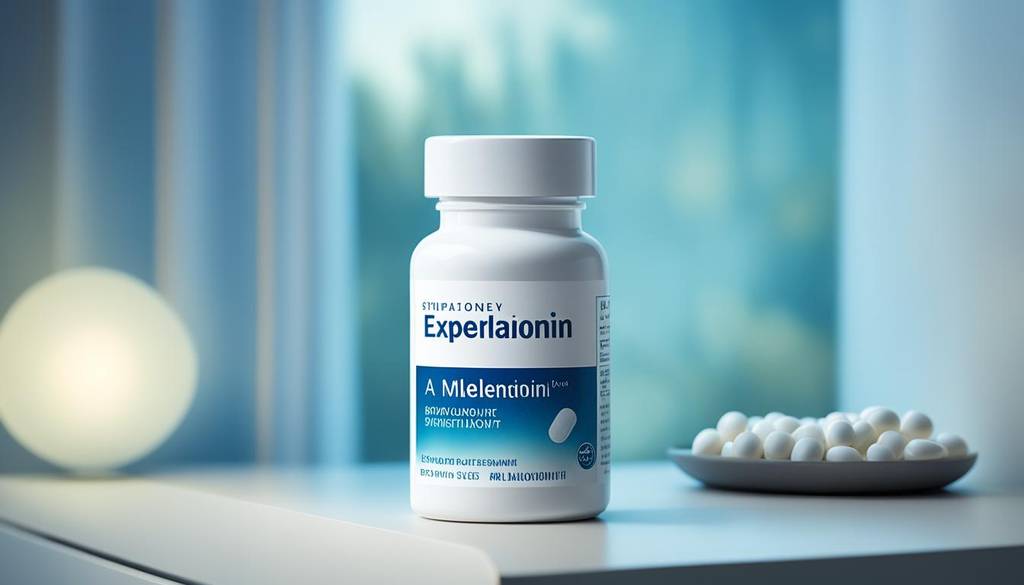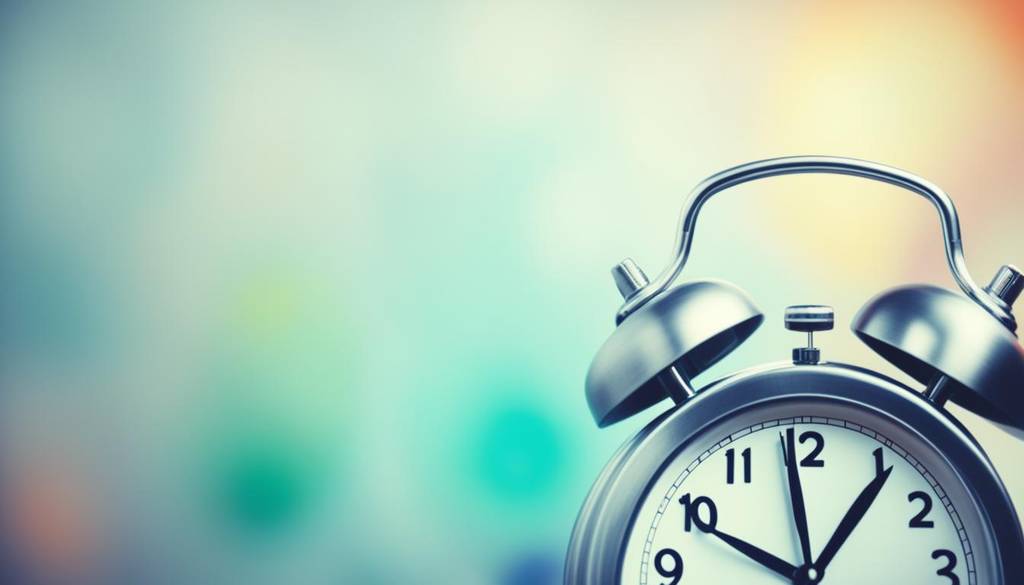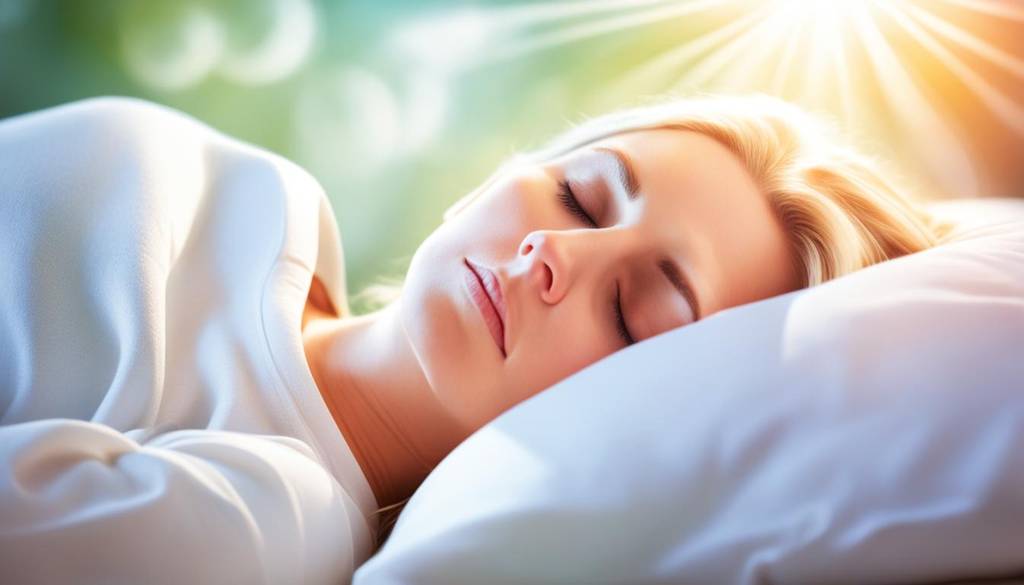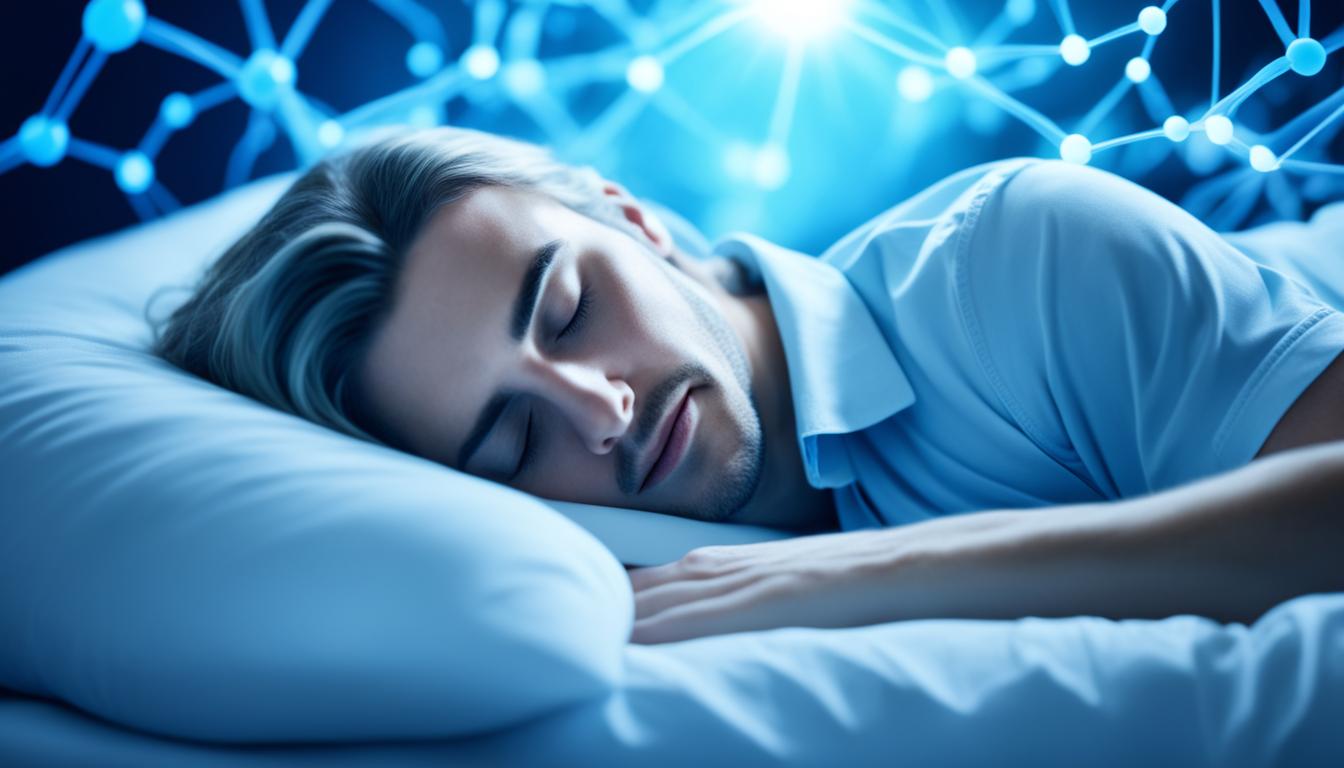Did you know that approximately 70 million adults in the United States suffer from sleep disorders? Lack of quality sleep can have a significant impact on our overall well-being and daily functioning. Fortunately, there is a natural sleep regulator that can help improve our sleep and enhance our restful nights: melatonin. In this comprehensive guide, I will explore the relationship between melatonin and sleep, discussing its natural sleep-regulating properties and how it can transform your bedtime routine for better sleep health.
Key Takeaways:
- Melatonin is a natural sleep regulator that plays a crucial role in promoting healthy sleep patterns.
- Approximately 70 million adults in the United States suffer from sleep disorders.
- Improving the quality of your sleep can have a significant impact on your overall well-being and daily functioning.
- In this guide, we will explore the benefits of melatonin and how it can enhance your restful nights.
- By incorporating melatonin into your bedtime routine, you can optimize your sleep health and achieve better rest.
Melatonin: The Natural Sleep Regulator
To understand how melatonin influences sleep, it’s important to grasp the concept of the sleep-wake cycle. The sleep-wake cycle is a natural biological rhythm that regulates our sleep and wakefulness patterns. It is controlled by various factors, including our internal body clock and external cues.
Understanding the Sleep-Wake Cycle
The sleep-wake cycle consists of alternating periods of sleep and wakefulness, typically following a 24-hour pattern. During the day, our bodies are in a wakeful state, characterized by alertness and activity. As the evening approaches, our body’s production of melatonin, a hormone that promotes sleep, increases.
When melatonin levels rise, we start to feel drowsy and prepare for sleep. This hormone helps regulate the timing and duration of our sleep. As we sleep, our melatonin levels gradually decrease, allowing us to wake up feeling refreshed in the morning.
How Darkness Influences Melatonin Production
Darkness is a crucial factor in the production of melatonin. When our surroundings become dark, such as during the evening or when we turn off the lights, our body’s melatonin production increases. This is why dimming the lights and creating a dark sleep environment can facilitate the onset of sleep.
Conversely, exposure to light, especially blue light emitted by electronic devices like smartphones and tablets, can suppress melatonin production, making it harder for us to fall asleep. It’s important to limit our exposure to bright lights, especially before bedtime, to promote healthy melatonin levels and enhance our sleep quality.
When to Consider Melatonin Supplements
While melatonin is naturally produced by the body, there are situations where melatonin supplements can be beneficial. If you’re experiencing sleep difficulties, melatonin supplements can provide a natural remedy to help improve your sleep quality.
When considering melatonin supplementation, it’s important to understand the circumstances that may warrant its use. If you find yourself struggling with falling asleep, staying asleep, or adjusting to a new sleep schedule, melatonin supplements can offer support. They can also be beneficial for individuals with conditions such as insomnia, jet lag, or shift work sleep disorder.
Melatonin supplements can provide relief for those who prefer natural remedies to address their sleep difficulties. By incorporating melatonin into your sleep routine, you may experience a more restful and rejuvenating night’s sleep.

With the right guidance and advice from healthcare professionals, melatonin supplements can be a safe and effective option to help regulate your sleep patterns. Before starting any new sleep aid, it’s always recommended to consult with your doctor or a sleep specialist to ensure it is suitable for your specific needs and health situation.
How Melatonin Helps with Sleep
Melatonin is a powerful sleep aid that has been demonstrated to be effective in improving sleep quality in various scenarios. In this section, we will explore how melatonin benefits individuals who suffer from sleep disorders, such as delayed sleep-wake phase disorder. We will also discuss its role in combating jet lag and regulating sleep for individuals who work night shifts.
Delayed Sleep-Wake Phase Disorder and Melatonin
Delayed sleep-wake phase disorder is a sleep disorder characterized by a delayed sleep schedule, making it difficult for individuals to fall asleep and wake up at conventional times. Melatonin can help regulate the sleep-wake cycle in individuals with this disorder by promoting earlier sleep onset. By taking melatonin supplements before bedtime, individuals with delayed sleep-wake phase disorder can shift their sleep schedule to a more desirable time, improving the overall quality of their sleep.
Using Melatonin to Combat Jet Lag
Jet lag occurs when individuals travel across multiple time zones, disrupting their circadian rhythm and making it challenging to adjust to the new schedule. Melatonin can be a valuable tool in combating jet lag by helping individuals adjust to the new time zone more quickly. Taking melatonin supplements before bedtime in the new time zone can assist in resetting the body’s internal clock, allowing for a smoother transition and improving sleep quality.
Shift Work and Melatonin’s Role
For individuals who work night shifts or irregular hours, sleep disruptions and difficulty falling asleep during the day are common challenges. Melatonin can play a crucial role in regulating sleep patterns for shift workers. By taking melatonin supplements before bedtime after a night shift, individuals can promote better sleep during the day, helping them optimize their sleep quality and adjust to their unconventional work schedules more effectively.
To illustrate the benefits of melatonin in combating sleep disorders, let’s take a look at the following table:
| Sleep Disorder | Melatonin Benefits |
|---|---|
| Delayed Sleep-Wake Phase Disorder | Promotes earlier sleep onset, helps regulate sleep-wake cycle |
| Jet Lag | Aids in adjusting to new time zones, improves sleep quality |
| Shift Work | Regulates sleep patterns, promotes better sleep during the day |
Determining Your Melatonin Dosage for Sleep
Finding the right melatonin dosage for sleep is crucial for achieving optimal results. Several factors can influence the appropriate dosage, including age, existing sleep disorders, and individual differences. Additionally, starting with low doses can help ensure safe and effective melatonin supplementation.
Factors Influencing Dosage
When determining the appropriate melatonin dosage for sleep, it is essential to consider the following factors:
- Age: Different age groups may require varying melatonin dosages. Children, adults, and older adults each have unique needs, and their ideal dosages should be determined accordingly.
- Existing Sleep Disorders: Individuals with sleep disorders may require higher melatonin dosages to alleviate their specific sleep difficulties. Consulting a healthcare professional is advisable in such cases.
- Individual Differences: Every person’s response to melatonin can vary. Factors like metabolism, overall health, and body weight can influence how melatonin is absorbed and processed within the body, necessitating personalized dosages.
Starting with Low Doses
To ensure safe and effective melatonin supplementation, it is recommended to start with low doses and gradually increase as needed. By starting with a low dosage, you allow your body to adjust to the hormone and minimize the risk of experiencing any adverse effects.

It’s important to remember that finding the right melatonin dosage may require some fine-tuning and experimentation. Consulting with a healthcare professional or a sleep specialist can provide valuable guidance and help determine the best dosage for your individual sleep needs.
By considering the factors that influence melatonin dosage and starting with low doses, you can ensure that your melatonin supplementation supports your sleep health effectively and safely.
Melatonin Side Effects: What to Expect
While melatonin is generally safe for most individuals, it’s important to be aware of potential side effects. Incorporating melatonin into your sleep routine can have various effects on your body. Here are some common melatonin side effects:
- Daytime drowsiness: Some individuals may experience drowsiness or grogginess the next morning after taking melatonin. This can impact your alertness and productivity throughout the day.
- Headaches: Melatonin can sometimes cause headaches, although this side effect is relatively rare.
- Nausea: In some cases, melatonin supplementation may lead to feelings of nausea or stomach discomfort.
- Dizziness: A small percentage of people may experience dizziness or lightheadedness as a side effect of melatonin use.
To minimize these risks and ensure a safe experience with melatonin, it’s important to take precautions:
- Start with a low dose: Begin with a low melatonin dosage and gradually increase if needed. This allows you to assess your body’s response and minimize the likelihood of side effects.
- Time it right: Take melatonin well before your desired bedtime to allow it to fully take effect and reduce the chances of morning grogginess.
- Consult a healthcare professional: If you have any underlying health conditions or concerns about potential interactions with medications you’re currently taking, it’s important to consult a healthcare professional before using melatonin as a sleep aid.

Choosing the Best Melatonin for Sleep
With a wide range of melatonin products available in the market, choosing the best one for your sleep needs can be overwhelming. When it comes to selecting high-quality melatonin supplements, several factors should be considered:
- Manufacturing Practices: Look for melatonin products that are made by reputable manufacturers and adhere to strict quality control standards. This ensures that you are getting a reliable and safe product.
- Ingredients: Read the product labels carefully to understand the ingredients used in the melatonin supplements. Opt for products that have minimal fillers and additives, and are free from any potential allergens.
- Dosage Forms: Melatonin supplements are available in different forms such as tablets, capsules, gummies, and liquids. Choose a dosage form that suits your preferences and makes it easier for you to incorporate into your bedtime routine.
By taking these factors into consideration, you can make an informed choice and select the best melatonin product to support your sleep. Remember, consulting with a healthcare professional is always a good idea before starting any new supplement.

Melatonin for Kids: Proceed with Caution
While melatonin can be beneficial for children with certain sleep issues, it is important to approach its use with caution and take into consideration safety concerns. Parents and caregivers should be aware of the ongoing debate surrounding the safety of melatonin for kids and the potential risks involved. Consulting healthcare professionals before administering melatonin to children is crucial to ensure the well-being of your child.
The Debate Over Safety
There is ongoing debate among experts regarding the safety of melatonin for children. Some studies suggest that melatonin is generally safe and effective when used in appropriate doses for short periods. However, there are concerns about its long-term effects, potential interactions with other medications, and the impact on the developing endocrine system. It is essential to stay informed about the latest research and expert opinions to make an informed decision.
Consulting Healthcare Professionals
Prior to considering melatonin for your child, it is highly recommended to consult healthcare professionals, such as pediatricians or sleep specialists. They can evaluate your child’s sleep difficulties, assess the potential underlying causes, and provide guidance on the appropriate use of melatonin. Healthcare professionals can determine the right dosage and duration based on your child’s specific needs, taking into account their age, overall health, and any existing medical conditions.
When it comes to your child’s health and well-being, it is always best to seek the advice of healthcare professionals who can provide personalized recommendations and ensure the safe use of melatonin as a sleep aid.
Natural Sleep Remedies vs. Melatonin Supplements
While melatonin supplements can be effective, it’s important to explore natural sleep remedies and alternatives. By incorporating a holistic approach to sleep, you can optimize your rest without solely relying on melatonin supplementation.
Improving Sleep Hygiene for Better Rest
Sleep hygiene refers to the habits and practices that promote quality sleep. Adopting good sleep hygiene can significantly enhance your sleep quality and overall well-being. Here are some practical tips to improve your sleep hygiene:
- Create a consistent sleep schedule by going to bed and waking up at the same time each day, even on weekends.
- Establish a relaxing bedtime routine to signal your body and mind that it’s time to sleep. This can include activities such as reading, taking a warm bath, or practicing deep breathing exercises.
- Create a comfortable sleep environment by keeping your bedroom cool, dark, and quiet. Consider using earplugs, an eye mask, or a white noise machine if needed.
- Avoid stimulants like caffeine and nicotine close to bedtime, as they can interfere with your ability to fall asleep.
- Limit your exposure to electronic devices, such as smartphones and tablets, before bed as the blue light emitted by these devices can disrupt your sleep-wake cycle.
- Engage in regular physical activity to promote better sleep. However, avoid exercising too close to bedtime, as it can stimulate your body and make it difficult to fall asleep.
Natural Alternatives to Support Sleep
In addition to sleep hygiene practices, there are several natural alternatives that can support healthy sleep:
- Relaxation techniques: Try incorporating relaxation techniques into your bedtime routine, such as meditation, yoga, or progressive muscle relaxation. These techniques can help calm your mind and relax your body, promoting better sleep.
- Herbal remedies: Certain herbs, such as valerian root, chamomile, and lavender, have been traditionally used to aid sleep. Consult with a healthcare professional to determine the appropriate dosage and form of herbal remedies.
- Lifestyle changes: Making lifestyle changes, such as avoiding heavy meals close to bedtime, limiting alcohol consumption, and managing stress levels, can have a positive impact on your sleep quality.
By incorporating these natural sleep remedies and focusing on sleep hygiene, you can optimize your sleep without solely relying on melatonin supplements. Remember to consult with a healthcare professional before starting any new sleep regimen or making significant changes to your routine.

Melatonin and Sleep
Melatonin plays a vital role in promoting healthy sleep patterns. It is a hormone that helps regulate the sleep-wake cycle and is often referred to as the “natural sleep regulator.” By understanding the relationship between melatonin and sleep, we can appreciate its importance in achieving quality rest and overall sleep health.
When it comes to sleep, quality is just as important as quantity. Getting enough sleep is essential for our physical health, mental well-being, and overall productivity. Lack of sleep can lead to various problems, including fatigue, poor concentration, and increased risk of chronic health conditions. That’s where melatonin comes in.
Melatonin not only helps regulate the sleep-wake cycle but also plays a role in improving sleep quality. It can enhance the duration and depth of sleep, leading to a more restful and rejuvenating experience. By incorporating melatonin into your bedtime routine, you can optimize your sleep and enjoy the benefits of enhanced sleep quality.
Furthermore, melatonin supplementation has been found to be particularly beneficial for individuals with sleep difficulties, such as those with delayed sleep-wake phase disorder, jet lag, or those who work night shifts. It can help reset the body’s internal clock and regulate sleep patterns, making it easier to fall asleep and wake up at the desired times.
It’s important to note that melatonin should be used with caution and under the guidance of a healthcare professional. While it is generally safe for most individuals, potential side effects and interactions with other medications should be considered.
In conclusion, melatonin plays a crucial role in promoting healthy sleep and improving sleep quality. By incorporating melatonin into your bedtime routine and seeking professional advice when needed, you can achieve optimal sleep health and wake up feeling refreshed and rejuvenated.
The Science of Melatonin Dietary Supplements
Melatonin dietary supplements have gained popularity as sleep aids, but what does the science say? In this section, I will explore the scientific evidence supporting the use of melatonin supplements for sleep. By examining the research, you can gain a deeper understanding of the efficacy and limitations of melatonin as a dietary supplement for sleep.
“Scientific evidence plays a crucial role in understanding the effectiveness of melatonin dietary supplements as sleep aids. By analyzing studies and research findings, we can uncover valuable insights into the potential benefits and considerations associated with their use.” – Sleep Scientist
Several scientific studies have investigated the effects of melatonin supplementation on sleep quality and sleep disorders. Research suggests that melatonin can help:
- Regulate the sleep-wake cycle by enhancing the body’s natural production of melatonin.
- Reduce the time it takes to fall asleep, particularly for individuals with insomnia or difficulty initiating sleep.
- Improve sleep duration and overall sleep quality, leading to a more restful night’s sleep.
- Alleviate symptoms of jet lag, assisting in the adjustment to new time zones.
- Manage sleep difficulties associated with shift work and other disruptions to the circadian rhythm.
While the scientific evidence supports the effectiveness of melatonin supplements as sleep aids, it’s important to note that individual responses may vary. Factors such as dosage, timing, and underlying sleep conditions can influence the outcomes. Consulting a healthcare professional is recommended to ensure the appropriate use of melatonin dietary supplements for your specific sleep needs.
| Scientific Evidence Supporting Melatonin Dietary Supplements | Conditions | Findings |
|---|---|---|
| Promotes Sleep Onset | Insomnia | Reduces the time it takes to fall asleep and improves sleep latency. |
| Enhances Sleep Quality | Sleep Disorders | Improves overall sleep quality and increases total sleep time. |
| Manages Jet Lag | Travel-Related Sleep Disruptions | Assists in adjusting the sleep-wake cycle to new time zones. |
| Aids Shift Workers | Shift Work Sleep Disorder | Regulates sleep patterns and improves sleep quality for individuals working non-traditional hours. |
It’s important to consider that melatonin dietary supplements should be used as part of a comprehensive sleep routine, including practicing good sleep hygiene and creating a sleep-inducing environment. Additionally, it’s vital to follow recommended dosage guidelines and seek medical advice if you have any underlying health conditions or are taking other medication.
The scientific evidence surrounding melatonin dietary supplements for sleep aids provides valuable insights into their potential benefits and effectiveness. By understanding the research, individuals can make informed decisions about incorporating melatonin into their sleep routine to achieve better rest and optimal sleep health.
Developing Healthy Sleep Habits Alongside Melatonin Use
Crafting a Sleep-Inducing Environment
While melatonin supplementation can be beneficial, it’s important to develop healthy sleep habits to enhance its effects. Creating a sleep-inducing environment can significantly improve your sleep quality. Here are some tips on optimizing your bedroom for quality sleep:
- Keep your bedroom dark and quiet: Use blackout curtains or an eye mask to block out light, and consider using earplugs or white noise to minimize disturbances.
- Ensure a comfortable sleep surface: Invest in a supportive mattress and pillows that suit your personal preferences.
- Maintain a cool temperature: Keep your bedroom slightly cool for optimal sleep comfort.
- Minimize electronic devices: Remove televisions, computers, and smartphones from the bedroom to reduce distractions and the impact of blue light on melatonin production.
The Role of Light in Melatonin Regulation
Light plays a crucial role in melatonin regulation. Exposure to bright light, especially blue light emitted by electronic devices, can suppress melatonin production and disrupt the sleep-wake cycle. To manage light exposure for optimal sleep-wake patterns:
- Avoid bright lights in the evening: Dim the lights in your home and limit exposure to electronic screens at least one hour before bedtime.
- Expose yourself to natural light during the day: Spend time outdoors during daylight hours to help regulate your body’s natural melatonin production.
- Consider using light therapy: Light therapy devices can help regulate melatonin production and improve sleep patterns, especially for individuals with sleep disorders or seasonal affective disorder.
By developing healthy sleep habits and managing your sleep environment, you can enhance the effects of melatonin supplementation and promote a restful sleep.
Addressing Chronic Sleep Issues with Professional Insight
While melatonin can be helpful for occasional sleep difficulties, chronic sleep issues may require professional insight. It is important to know when to talk to your doctor about sleep problems and understand underlying sleep disorders that may be contributing to your sleep issues.
When to Talk to Your Doctor About Sleep Problems
If you are experiencing persistent insomnia or if your sleep difficulties are impacting your daily life and overall well-being, it may be time to consult a doctor. Chronic sleep issues can have a significant impact on your physical and mental health, so seeking medical guidance is crucial to address the root causes and find appropriate treatment.
Some signs that indicate it is time to talk to your doctor about your sleep problems include:
- Frequent difficulty falling asleep or staying asleep
- Excessive daytime sleepiness or fatigue
- Snoring or gasping for air during sleep
- Nightmares or night sweats that disrupt sleep
- Routine use of sleep aids without improvement in sleep quality
By discussing your sleep problems with a healthcare professional, you can receive a proper evaluation and diagnosis, as well as personalized recommendations for improving your sleep.
Understanding Underlying Sleep Disorders
Chronic sleep issues may be indicative of underlying sleep disorders that require specialized treatment. Some common sleep disorders that can disrupt your sleep and affect your overall health include:
- Insomnia: Characterized by difficulty falling asleep or staying asleep, insomnia can be caused by various factors such as stress, anxiety, or medical conditions.
- Sleep apnea: A sleep disorder characterized by pauses in breathing during sleep, often accompanied by loud snoring and daytime sleepiness.
- Restless legs syndrome: Causes uncomfortable sensations in the legs, leading to an uncontrollable urge to move them, which can disrupt sleep.
- Narcolepsy: A neurological disorder that affects the regulation of sleep-wake cycles, leading to excessive daytime sleepiness and sudden episodes of falling asleep.
To accurately diagnose and treat sleep disorders, it is essential to consult a healthcare professional who specializes in sleep medicine. They can conduct thorough evaluations, recommend appropriate tests, and help develop a tailored treatment plan for your specific condition.
Conclusion: Balancing Melatonin Use for Optimal Sleep Health
In conclusion, melatonin is a valuable tool for improving sleep quality and achieving optimal sleep health. Throughout this article, we have explored the relationship between melatonin and sleep, delving into its natural sleep-regulating properties and how it can benefit your bedtime routine. However, it is important to strike a balance when using melatonin and consider other healthy sleep habits.
To optimize your sleep health, it is essential to combine melatonin use with good sleep hygiene practices. Creating a sleep-inducing environment by optimizing your bedroom and managing light exposure can greatly enhance the effectiveness of melatonin supplementation. Additionally, prioritizing a consistent sleep schedule, practicing relaxation techniques, and adopting a healthy lifestyle can contribute to long-term improvements in your sleep quality.
While melatonin can be beneficial, it is also important to seek professional advice when needed. If you experience chronic sleep issues or suspect underlying sleep disorders, consulting a healthcare professional is crucial to address the root causes of your sleep problems and receive appropriate treatment.
By finding the right balance between melatonin use and healthy sleep habits, you can optimize your sleep health and enjoy the restful nights you deserve. Take charge of your bedtime routine and discover the transformative power of melatonin in achieving better sleep.
FAQ
What is melatonin and how does it affect sleep?
How does darkness influence melatonin production?
When should I consider taking melatonin supplements?
How can melatonin help with sleep disorders?
How do I determine the right melatonin dosage for sleep?
What are the potential side effects of melatonin supplementation?
How do I choose the best melatonin supplement for sleep?
Is melatonin safe for children?
Are there natural alternatives to melatonin supplements for better sleep?
How does melatonin impact sleep health overall?
Is there scientific evidence supporting the use of melatonin as a dietary supplement for sleep?
What are some tips for developing healthy sleep habits alongside melatonin use?
When should I seek professional insight for chronic sleep issues?
Source Links
- https://www.sleepfoundation.org/melatonin
- https://www.hopkinsmedicine.org/health/wellness-and-prevention/melatonin-for-sleep-does-it-work
- https://www.nytimes.com/2020/04/24/well/melatonin-sleep-aid-coronavirus.html



